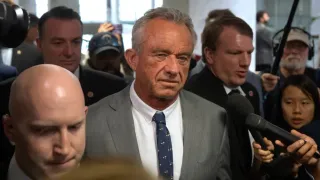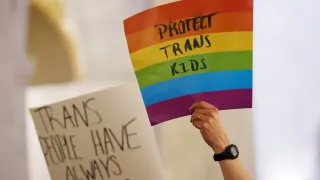April 11, 2015
Pot, Meet Kettle: Virginia, Meet Indiana
Kilian Melloy READ TIME: 4 MIN.
Maybe Terry McAuliffe thought he was being clever.
Maybe the governor of the Old Dominion just saw an opportunity to serve as cheerleader and economic salesman for his state, a role he has embraced since taking office last year. Perhaps he even relished the opportunity to take a jab at fellow governor Mike Pence (R-Ind.), a former U.S. House member and conservative icon popular among the far right, whose name has previously been floated as a potential future president or vice president.
Whatever the reason, amid the furor directed at the state of Indiana - following the approval of a law that would allow private businesses to discriminate against LGBT people - McAuliffe (D) crafted an open letter to Indiana businesses sour about the law, urging them to cut ties with the Hoosier State and relocate to Virginia.
The letter, which was published in The Indianapolis Star, urged businesses to consider the commonwealth's business-friendly, low-tax environment, its natural resources and, most puzzlingly, the state of LGBT rights in Virginia. McAuliffe's pitch came amid a strong backlash from the business community, which has largely embraced LGBT rights to better enhance their bottom lines, against Indiana's Religious Freedom Restoration Act (RFRA) law.
Although Hoosier lawmakers eventually passed a "fix" to the RFRA law that has seemed to placate the majority of businesses and convince them that the law will not allow discrimination or the denial of services to LGBT people, McAuliffe's pitch still appeared to ring hollow to many closer to home. As soon as the governor made his statements, the reality of the commonwealth's laws came into conflict with the governor's rhetoric touting Virginia as gay-friendly.
For one thing, while McAuliffe's first executive order prohibited LGBT discrimination in state employment, mirroring executive orders passed by previous governors Mark Warner (D) and Tim Kaine (D), that order only remains in effect as long as McAuliffe stays in office.
"It's nice to have a friendly person in government, but there's a reason we put things in statute," said Richard J. Rosendall, president of the D.C.-based Gay and Lesbian Activists Alliance (GLAA) when asked about McAuliffe's comments. "[But] those protections go away when McAuliffe does.... Public policy should not just be based on a personality."
Moreover, there is no prohibition from discriminating against someone based on their sexual orientation or gender identity in other forms of public or private employment, housing, credit or public accommodations. Some legislative allies have introduced bills dealing with those issues, but only a handful have ever passed the state senate and none have managed to make it out of subcommittee in the House of Delegates, which Republicans control by a 67-32-1 margin.
Sensing a weakness that McAuliffe himself had exposed, Victoria Cobb, the president of the Family Foundation of Virginia, a socially conservative policy and lobbying organization with significant clout in the General Assembly, pounced. Using McAuliffe's pitch to technology and other companies uncomfortable with the Indiana law, Cobb defended her organization's opposition to bills that expand LGBT rights.
"It's good to see that the Governor has conceded that Virginia does not need to elevate sexual behavior to a protected class in order to be an inclusive state, but it's unfortunate that he has joined the parade of those who are distorting the true effect of Religious Freedom Restoration Acts," Cobb told The Washington Post in an email.
Requests seeking comment from the governor's office in response to Cobb's assertions went unanswered.
Cobb's comments, published in the Post without any significant pushback from allies as to why nondiscrimination protections are necessary, prompted an exasperated response from Equality Virginia, the state's top LGBT rights organization, which sought to respond to the Family Foundation while also carefully trying not to alienate McAuliffe, who has been a strong ally.
"Equality Virginia appreciates the enthusiasm and support that Governor McAuliffe has shown the LGBT community, and in making the commonwealth a more inclusive place to live," Equality Virginia Executive Director James Parrish said. "We believe, and expect that he would agree, as Executive Order 1 showed, that it is important to protect LGBT people from discrimination in the workplace and beyond."
VA-HD53-Simon
But Delegate Marcus Simon (D-Falls Church, Pimmit Hills, Merrifield) offered the most assertive pushback against those who would oppose LGBT protections. In an interview with Metro Weekly, Simon, who was the chief patron of several measures dealing with employment protections for LGBT people, fair housing and amending the commonwealth's laws to reflect the on-the-ground reality of same-sex marriages in the state, said it is time to take a harder look at those issues.
"Can we claim to be a state that's welcoming with a straight face, without backing it up in our laws?" Simon questioned.
Virginia had its own run-in with RFRA-style laws earlier in the year when Del. Bob Marshall (R-Manassas, Manassas Park, Sudley, Bull Run) introduced two measures that would allow licensed businesses and state contractors to discriminate against LGBT people under the guise of religious freedom.
"The challenge is in our messaging," Simon said of those who support the LGBT community in the commonwealth. "It is a liberty issue, but not religious liberty. It's about the freedom to be who you are, and not be denied the liberty to shop where you want, or be employed, or access housing."
Simon also said that LGBT supporters need to stop "talking like lawyers" and start highlighting real people and real-life examples of how any form of discrimination infringes on the liberty of fellow Virginians. He also said that more of his fellow lawmakers need to be less concerned about their political "branding" or the idea that they might offend people or be tagged as a "left-wing radical" just for opposing discrimination and supporting LGBT protections.
"The people who support these RFRA laws really don't want religious liberty," Simon said. "They want the right to be bigots. It's a smokescreen. And the more we call them out on it, the better off we'll be."
Featured image credit: Kate Wellington / Flickr
 Copyright MetroWeekly. For more articles from MetroWeekly visit
Copyright MetroWeekly. For more articles from MetroWeekly visit 





